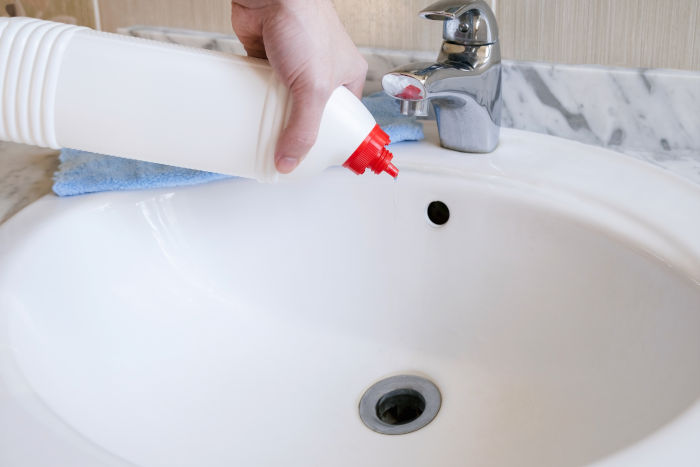As a homeowner in the UK, you’re probably no stranger to the importance of proper drain maintenance. With the unpredictable weather and lush greenery around, it’s easy for drains to get clogged or blocked. But fear not! Maintaining clean drains doesn’t have to be a daunting task. In this blog, we’ll share some easy-to-follow tips and tricks to keep your drains flowing smoothly without delving into technical jargon.
Regularly clean strainers and stoppers
Let’s start with the basics. Many sinks and bathtubs have strainers or stoppers to catch hair, soap scum, and debris. Make it a habit to clean these regularly. Hair and soap buildup can quickly lead to blockages, and a simple rinse or wipe can prevent this from happening.
Mind what goes down the drain
Being mindful of what you put down the drain is key to avoiding clogs. Avoid pouring grease or oil down the kitchen sink, as they can solidify and cause blockages. In the bathroom, try to minimise the amount of hair and soap scum that goes down the drain. Investing in a drain cover can help capture these materials before they cause problems.
Hot water and baking soda
Once a week, treat your drains to a hot water and baking soda cocktail. Boil a kettle of water and pour it down the drain, followed by a half-cup of baking soda. This will help break down any buildup and eliminate odours. It’s a simple and effective way to keep your drains fresh.
Vinegar and baking soda magic
For stubborn clogs or as a monthly preventative measure, the vinegar and baking soda combo can work wonders. Start by pouring a cup of baking soda down the drain, followed by a cup of vinegar. After a few minutes, flush it all down with hot water. The fizzy reaction helps dislodge debris, leaving your drain clear.
Use a plunger
No need to be a DIY expert to use a plunger! It’s a handy tool for clearing minor blockages in sinks, toilets, and showers. Remember to cover the overflow holes when plunging a sink or tub to create better pressure. A few gentle pumps can often do the trick.
Be mindful of outdoor drains
In the UK, outdoor drains can often get blocked with leaves, dirt, or even small debris from gardens. Regularly check and clear your outdoor drains, especially after heavy rain or during the autumn season. A simple rake or a gloved hand can help keep these drains clear and prevent flooding.
Seek professional help when needed
If you’ve tried the above tips and still face drainage issues, it might be time to call in a professional plumber. They have the expertise and tools to tackle more complex blockages and ensure your drains are in top shape. Here’s when you should consider seeking their help:
-
Stubborn blockages
If you’ve tried the DIY methods mentioned earlier and the blockage persists, it’s time to call a professional. Plumbers have specialised equipment, such as drain snakes and high-pressure water jets, that can effectively clear even the toughest clogs without damaging your pipes.
-
Foul odours
Persistent foul odours emanating from your drains could indicate a more serious issue, such as a sewer line problem. Plumbers can identify the source of the odour and address it appropriately.
-
Slow drainage
If water is draining slowly from multiple fixtures in your home, this could be a sign of a more significant issue within your plumbing system. A plumber can perform a thorough inspection to diagnose and resolve the problem.
-
Tree root intrusion
In older homes, tree roots can infiltrate underground drains, causing blockages and damage. A professional plumber can use specialised equipment to locate and remove these invasive roots, preventing further issues.
-
Regular maintenance
Some homeowners prefer to schedule regular professional drain maintenance as a preventative measure. A plumber can conduct routine inspections and cleanings to ensure your drains remain free from buildup and potential problems.
-
Installing drain screens
For homeowners looking to prevent future issues, plumbers can install drain screens or traps that catch debris before it enters the drain system. This proactive step can significantly reduce the risk of clogs.
-
Upgrading drainage systems
If you live in an older home with outdated drainage systems, a plumber can help you upgrade to modern, more efficient plumbing. This can improve drainage performance and reduce the likelihood of future issues.
Maintaining clean drains doesn’t have to be a complicated process. With a few simple habits and DIY solutions, you can keep your drains flowing smoothly and avoid costly plumbing emergencies. Remember to stay vigilant, be mindful of what goes down your drains, and don’t hesitate to seek professional help when needed. By following these tips, you can ensure your home’s drainage system remains trouble-free, allowing you to enjoy peace of mind.


